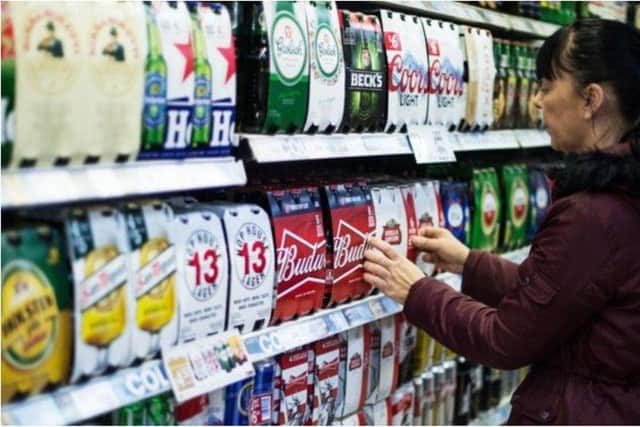Scots are not flocking across the border to buy cheaper booze, study reveals
and live on Freeview channel 276
The Scottish Government instituted the controversial policy – which placed a minimum cost of 50p per unit of alcohol – in a bid to clamp down on the number of low-cost, high-alcohol drinks available in the country.
Before its implementation, some claimed the rules could see Scots flocking across the border to buy cheaper alcohol or purchase from other countries online, therefore rendering the new rules meaningless, but research from Public Health Scotland (PHS) shows this is not happening to any great extent.
Advertisement
Hide AdAdvertisement
Hide AdThe report, released on Tuesday, found that just 3% of the more than 1,000 people asked said they had travelled to another part of the UK solely to buy alcohol.


Analysis of off-licences in north-east and north-west England found just a 1.14% increase in alcohol sales since before the policy was put in place in 2018.
None of the retailers interviewed by the researchers said they knew of anyone travelling to England to make bulk alcohol purchases to save money after price rises north of the border.
Assessments of online purchasing also found that significant savings from buying from elsewhere in the UK would require a substantial bulk purchase.
Advertisement
Hide AdAdvertisement
Hide AdPublic health minister Maree Todd said: “These findings mirror those of other studies and show that any cross-border purchasing which does take place is unlikely to be large enough to have any negative effect on the intended outcome of MUP which is to help reduce alcohol-related harm.
“Reducing alcohol-related harm is a key priority for the Scottish Government and the 3.5% decrease in alcohol sales we have seen following the introduction of minimum unit pricing in May 2018 reinforces why Scotland was right to take this innovative step.
“Given the clear and proven link between consumption and harm, minimum unit pricing is the most effective way to tackle cheap, high-strength alcohol that causes so much damage to so many families.
READ MORE: Minimum alcohol pricing had little impact on levels of drink-related crime in Scotland, study finds
The minister went on to say that the level of MUP was currently being reviewed.
Advertisement
Hide AdAdvertisement
Hide AdHelen Chung Patterson, a public health intelligence adviser at PHS, said: “The research published today shows that while cross-border purchasing does happen, the extent is small relative to the purchasing behaviours of Scotland’s population as a whole.
“A key strength of this report is that it enables us to build up a picture of cross-border alcohol-purchasing behaviours from several perspectives.
“We have examined data on retail sales and alcohol licensing near the border, drawn on qualitative interviews with retailers, gathered customer survey data and explored the factors affecting in-person and online cross-border purchases.
“When several different methods produce broadly similar results, as is the case with the report published today, this increases confidence in the findings.”
Advertisement
Hide AdAdvertisement
Hide AdAccording to figures released last year, alcohol sales in Scotland dropped to the lowest point in 26 years in 2020, but during the same year, deaths linked solely to alcohol increased by 9% to 1,190.
A message from the Editor:
Thank you for reading this article. We're more reliant on your support than ever as the shift in consumer habits brought about by coronavirus impacts our advertisers.
If you haven't already, please consider supporting our trusted, fact-checked journalism by taking out a digital subscription.
Comment Guidelines
National World encourages reader discussion on our stories. User feedback, insights and back-and-forth exchanges add a rich layer of context to reporting. Please review our Community Guidelines before commenting.